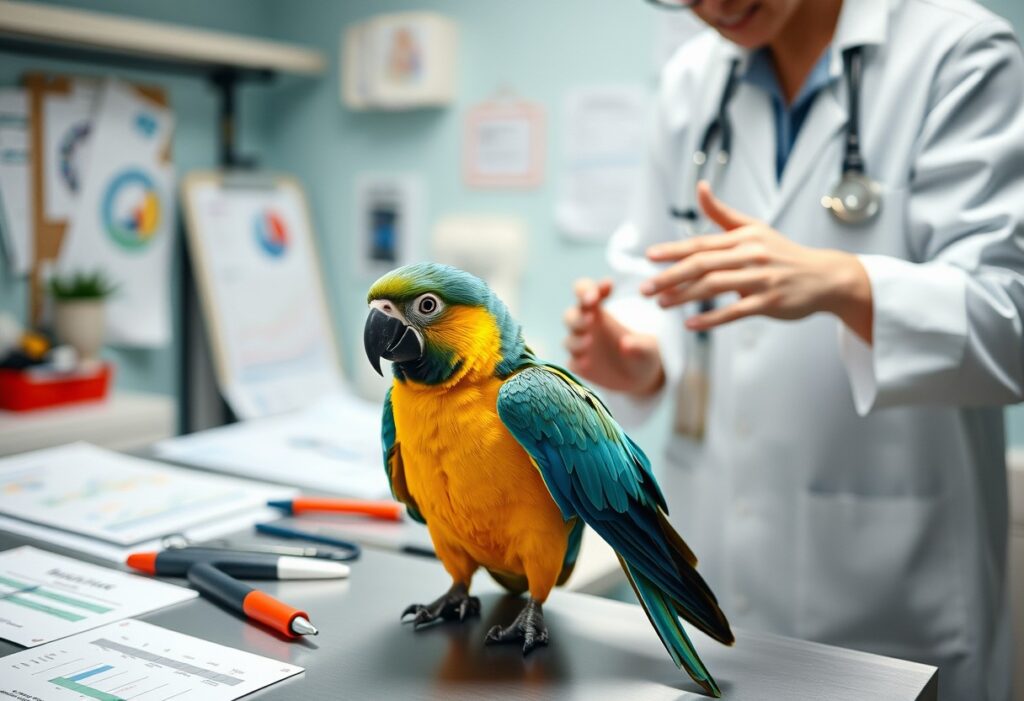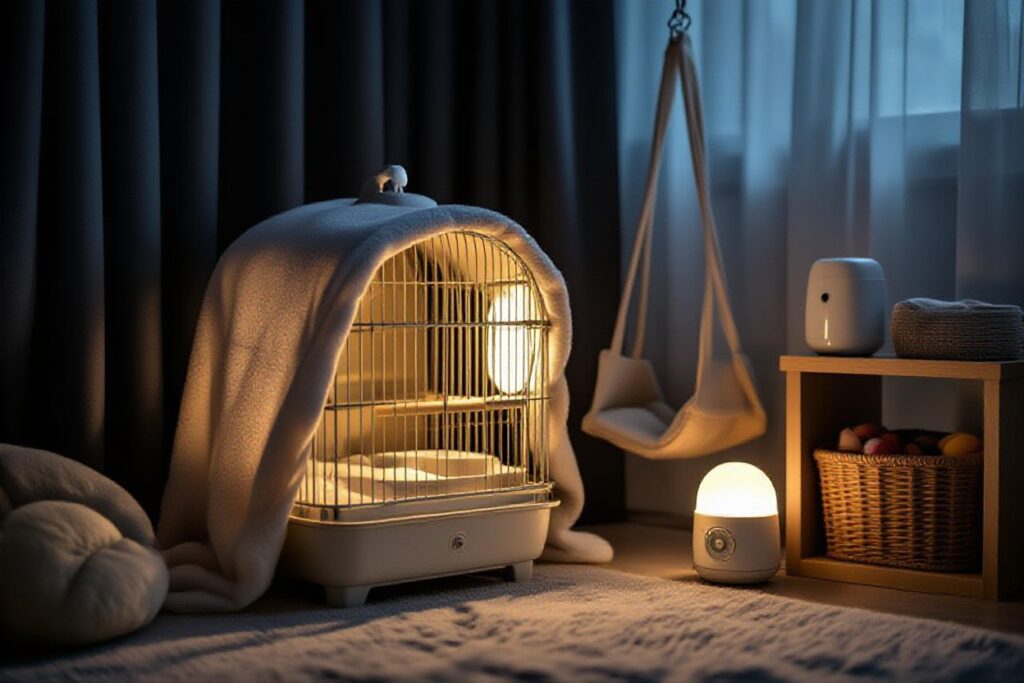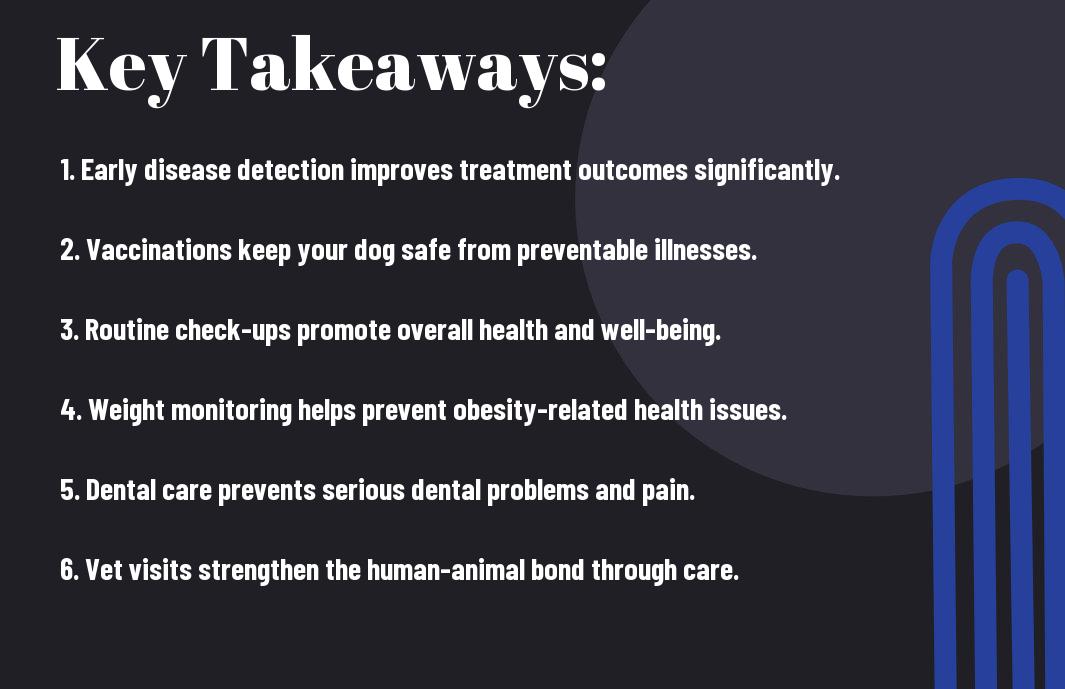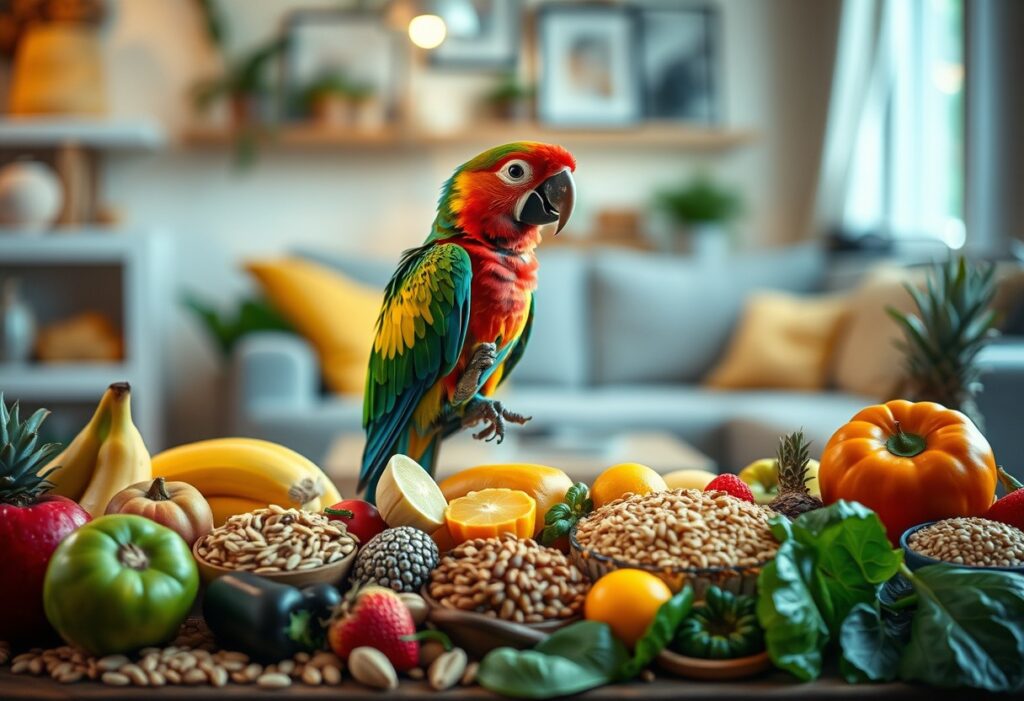With the unique health needs of pet birds, regular vet visits are crucial to ensure their wellbeing and longevity. You may not realize that birds often disguise their illnesses until it’s too late, making preventative care necessary. Scheduling routine examinations allows your veterinarian to catch any potential health issues early, providing you with the opportunity to address them before they escalate. By prioritizing these visits, you’re taking important steps towards maintaining your feathered friend’s health and happiness.
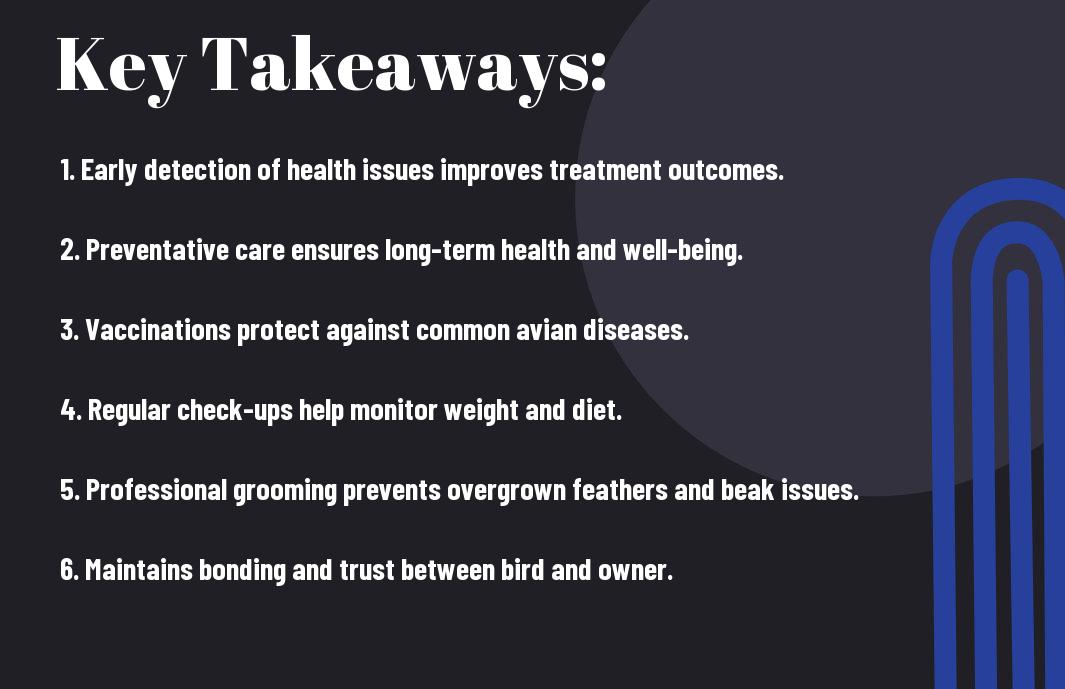
Health Benefits of Regular Vet Visits
A regular vet visit is imperative for ensuring the long-term health and well-being of your pet bird. Birds, by their nature, tend to hide signs of illness until they are very unwell, making it crucial for you to take proactive steps in monitoring their health. Regular check-ups provide a comprehensive assessment of your bird’s physical state, helping to maintain their vitality and happiness. Through timely evaluations, you can help your feathered friend live a longer, healthier life.
Early Detection of Illness
Detection of health issues at an early stage can make all the difference in your bird’s life. During routine vet appointments, the veterinarian will conduct thorough physical examinations and may recommend various diagnostic tests such as blood work or x-rays. These evaluations can reveal underlying health issues that may not yet be apparent, allowing for swift intervention. Early detection can lead to more effective treatment options, reducing the risk of severe complications and associated costs.
Moreover, an experienced vet knows the typical behaviors and physical signs to look for in your specific bird species. By understanding your pet’s normal state, they can better identify subtle changes that might indicate a problem. By keeping up with regular visits, you’re not only safeguarding your bird’s health but also ensuring peace of mind for yourself.
Preventative Care and Vaccinations
The importance of preventative care and vaccinations cannot be overstated. Regular vet visits provide you with the opportunity to discuss vaccination protocols specific to your bird’s needs and lifestyle. Some diseases can be effectively prevented through timely vaccinations, which can save your bird from potential suffering and you from additional expenses stemming from treatment after the fact.
Additionally, your vet can offer tailored advice about environmental factors that may affect your bird’s health, ensuring you are doing everything possible to maintain a safe and enriching habitat. These proactive measures can significantly reduce the chances of serious health concerns arising in the future.
Nutritional Guidance
Detection of nutritional deficiencies is another critical aspect of your bird’s health that can be addressed during regular vet visits. Your vet can assess your bird’s diet and recommend adjustments that support its overall well-being. Proper nutrition is fundamental, as it affects not only physical health but also behavioral aspects, such as activity levels and mood.
Benefits of receiving expert nutritional guidance include improved energy levels, a shinier feather coat, and even better immunity. By ensuring that your bird receives a balanced diet rich in the necessary vitamins and minerals, you can significantly enhance its quality of life. Your vet’s insights can also help you avoid common pitfalls, like over-reliance on seed-based diets, which can lead to obesity or other health issues.
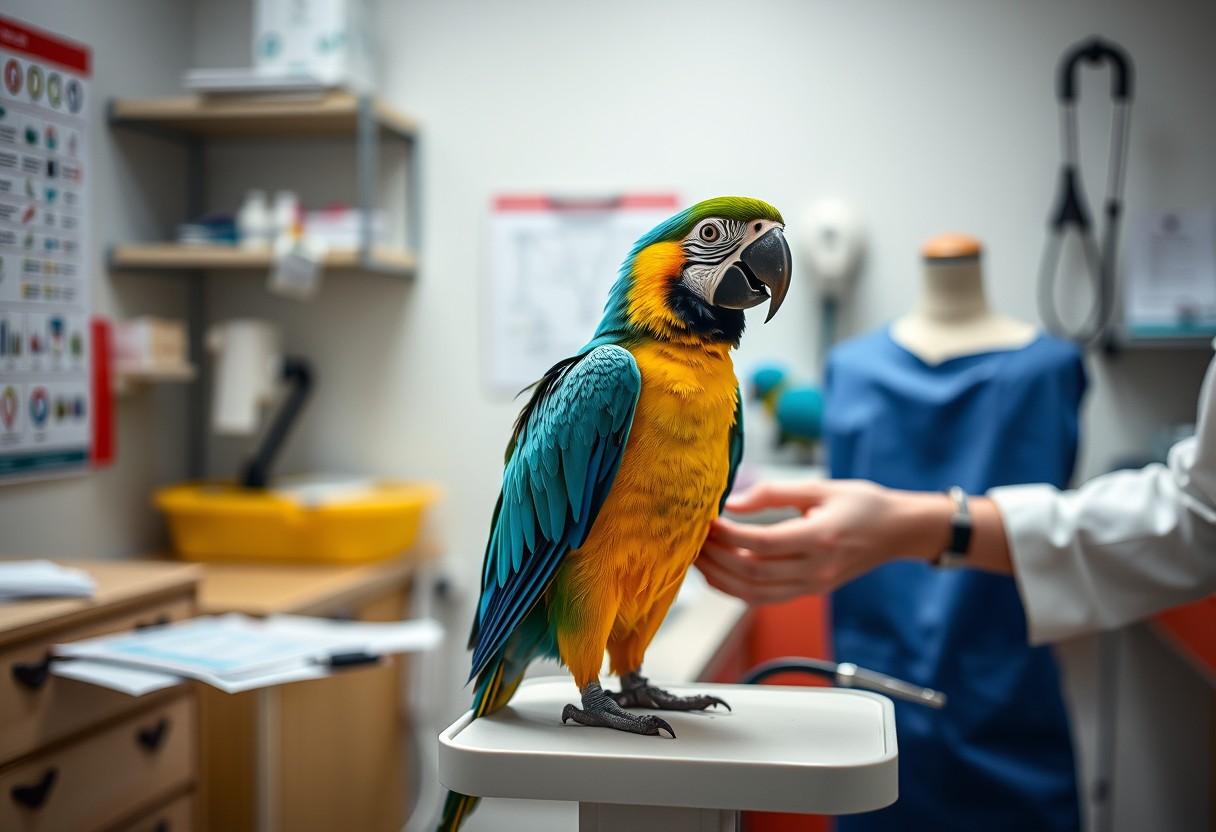
Behavioral Observations
You may not realize it, but your pet bird’s behavior is a crucial indicator of its overall health and well-being. Regular vet visits provide an opportunity for your avian veterinarian to observe any changes in your bird’s behaviors, which can signal underlying health issues. Stress and behavioral issues often go hand in hand; therefore, being vigilant about these signs can assist in early detection and intervention.
Stress and Behavioral Issues
Any unusual behavior—such as excessive screaming, feather plucking, or changes in eating habits—can indicate that your bird is experiencing stress or other behavioral issues. It’s important to recognize these signs early, as they can lead to more severe health problems if left unaddressed. Take note of any changes around your home as well, as factors such as new pets, loud noises, or even changes in your routine can contribute to your bird’s stress levels.
Socialization and Enrichment Tips
Any bird needs frequent social interaction and mental stimulation to thrive. Regular vet visits can also help you understand your bird’s specific socialization needs. Enrichment tools like toys, swings, and daily interaction are important for keeping your bird mentally healthy. Moreover, involving your bird in your daily routine can significantly reduce feelings of loneliness, which in turn lowers stress levels.
- Engage your bird with interactive toys that encourage problem-solving.
- Set aside daily time for one-on-one playtime to promote bonding.
- Rotate toys and perches to keep your bird’s environment stimulating.
The happier your bird is, the more it will thrive! This focus on socialization is vital not only for preventing stress but also for building a trusting relationship between you and your pet.
- Introduce your bird gradually to new experiences to prevent overwhelming it.
- Encourage exercise through flight or climbing to enhance physical health.
- Offer treats that require foraging to stimulate your bird’s natural instincts.
The key to a healthy and happy pet bird lies in your ongoing engagement with them, making regular vet visits a critical part of that equation.
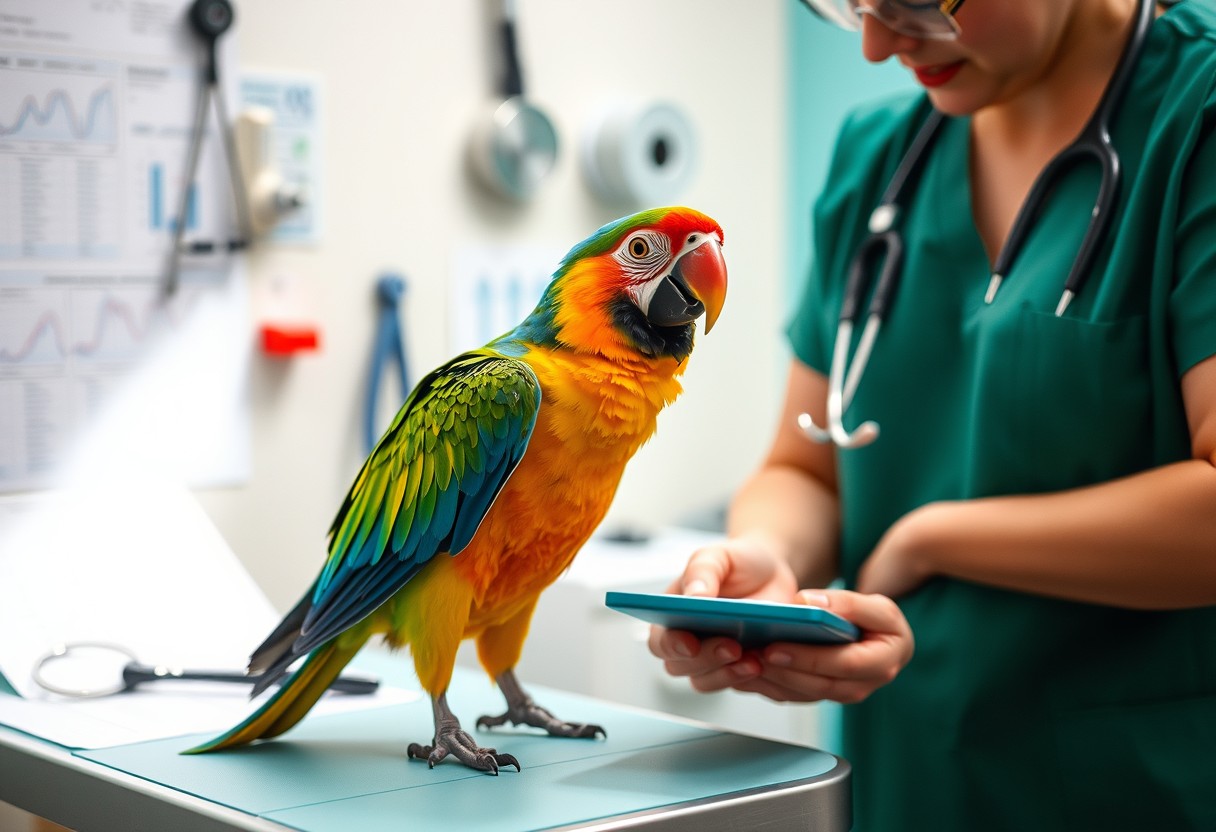
The Importance of Regular Vet Visits for Pet Birds
Despite the common misconception that pet birds require less care than other pets, providing the right living conditions is crucial for their overall health and well-being. Regular veterinary visits play a vital role in maintaining these conditions. A qualified veterinarian can assess factors such as diet, activity levels, and potential environmental hazards that might not be immediately apparent to you. These assessments ensure that you provide an environment that promotes your bird’s physical and mental wellness.
Housing and Environmental Assessments
On your journey to provide the best habitat for your pet bird, consider scheduling a veterinary check-up that includes a thorough housing assessment. Your veterinarian will examine your bird’s living space, identifying any potential hazards such as drafts, toxic plants, or harmful substances. They can evaluate the temperature and humidity levels to ensure they are suitable for your bird’s species. Proper ventilation and lighting are equally necessary, as they affect your bird’s health and mood. Regular assessments help you spot issues early, allowing you to make changes before they escalate into health problems.
Recommendations for Cage Setup
Conditions for your bird’s cage setup are critical not only for comfort but also for safety. Ensure that the cage is spacious enough to allow for movement, with perches at different heights and a variety of toys that engage their natural instincts. It’s necessary to use appropriate materials for perches and toys, as certain woods and plastics can be dangerous if ingested or chewed. Additionally, your bird will benefit from a consistent routine, so be mindful of where you position the cage—near family activities but away from direct sunlight and drafts. These elements contribute to a balanced environment that promotes your bird’s mental and physical health.
Plus, consider the layout of the cage carefully. Incorporating several perches, appropriate toys, and enrichment activities within the cage is key to preventing boredom and encouraging physical activity. Regularly rotate toys to keep your bird engaged and to prevent negative behaviors that can arise from solitude or stress. Always ensure food and water containers are accessible and easy to clean, as hygiene is paramount in preventing disease. A well-maintained habitat not only enhances your bird’s well-being but also minimizes the risks of health issues that may result from inadequate living conditions.
Conclusion
So, ensuring that your pet bird receives regular veterinary check-ups is crucial for their health and well-being. Just like any other pet, birds can experience a range of health issues that may not be immediately apparent to the untrained eye. Routine visits to an avian veterinarian can help identify potential problems early on, allowing for timely intervention and treatment. This proactive approach not only helps maintain your bird’s physical health but also contributes to their mental and emotional well-being, as a healthy bird is a happy bird.
In addition, regular vet visits also provide you with the opportunity to gain valuable insights and knowledge about your bird’s specific needs, behaviors, and dietary requirements. By partnering with a qualified veterinarian, you can set the foundation for a long, healthy life for your feathered friend. Keep in mind, investing in your bird’s health today will pay off in the joy and companionship they bring into your life for years to come.
FAQ
Q: Why are regular vet visits crucial for pet birds?
A: Regular vet visits are vital for pet birds because they help monitor the bird’s overall health and well-being. Birds are often adept at hiding illnesses until they become severe, making preventative care crucial. Routine check-ups allow vets to catch potential health issues early and provide necessary vaccinations, nutritional advice, and behavioral assessments. Additionally, regular visits can lead to better diet management and help identify environmental stressors that affect your bird’s happiness and health.
Q: What specific health issues can be detected during a vet visit for my bird?
A: During a vet visit, a veterinarian can perform a thorough physical examination, which may reveal signs of respiratory infections, feather plucking, skin conditions, and gastrointestinal issues. They can also conduct diagnostic tests such as blood work or fecal exams to identify underlying health concerns like parasites, bacterial or fungal infections, and organ dysfunction. Early detection of these issues can lead to more effective treatment and improved quality of life for your pet bird.
Q: How often should I take my pet bird to the vet?
A: It is generally recommended to take your pet bird to the vet at least once a year for a wellness check-up, regardless of their age or apparent health. However, older birds or those with known health conditions may require more frequent visits, such as every six months. Also, if you notice any behavioral changes or signs of illness, like changes in appetite, lethargy, or changes in droppings, you should schedule a visit to the vet immediately. Regular visits help ensure your bird stays healthy and receives the care they need throughout their life.
